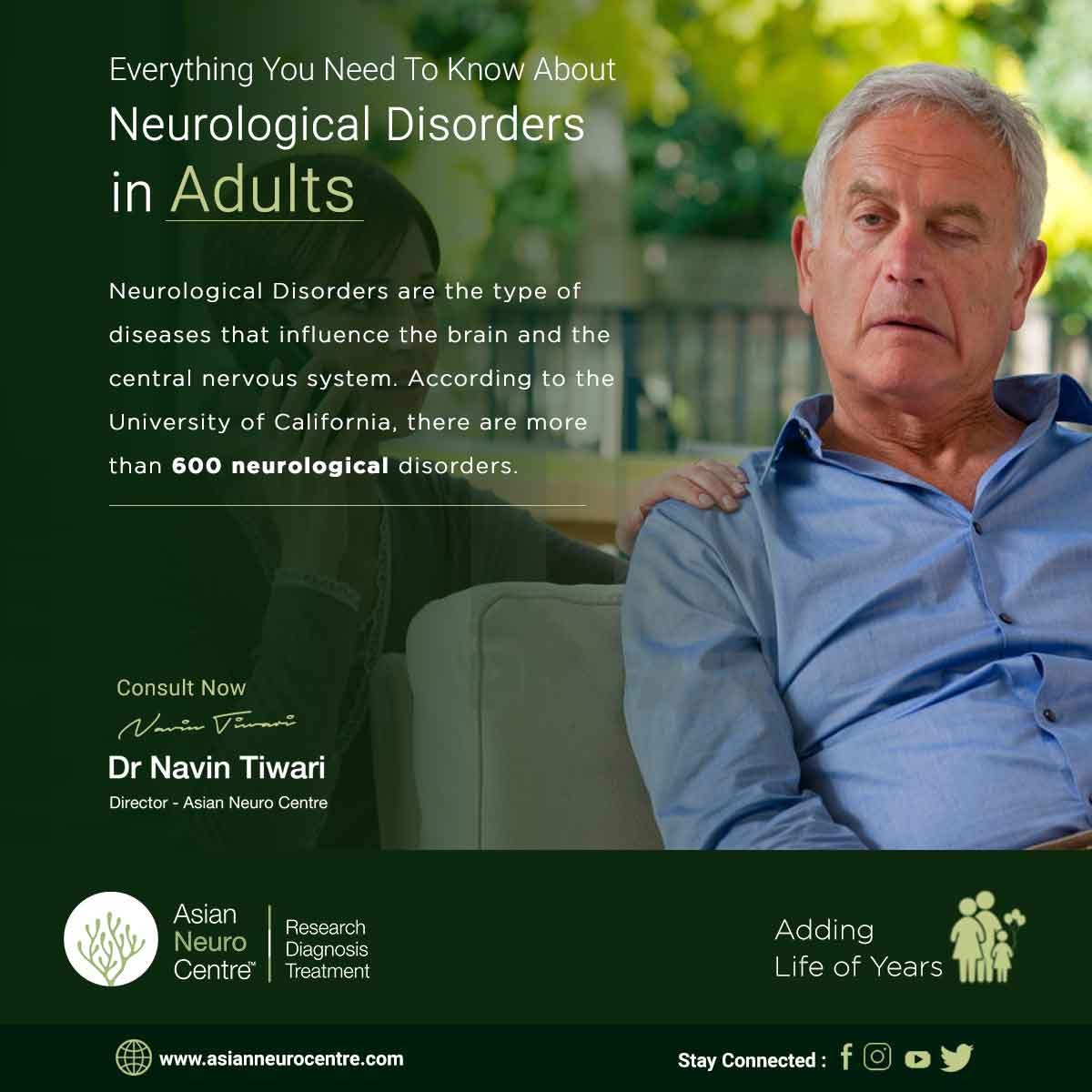- Have any questions?
- 911 12345 29
- info@asianneurocentre.com
Everything You Need To Know About Neurological Disorders in Adults

Why 2021 will be an Amazing Year? Dr. Navin Tiwari
January 1, 2021
How Food And Exercise Affect People with Epilepsy? | Dr. Navin Tiwari
January 13, 2021Neurological Disorders in adults: – The brain is amazing and complex, but a lack of understanding of it has created a great variety of myths throughout the years. Like a bigger brain is better. Or Depression is the only neurological disorder.
This article will help you clear your all doubts and tell you exactly in how many ways your brain can go crazy, how to identify those symptoms, and if possible, how to prevent it.
Neurological Disorders are the type of diseases that influence the brain and the central nervous system. According to the University of California, there are more than 600 neurological disorders.
Thus it would be better to understand the types of neurological disorders before you start looking for their signs and symptoms.
Types of Neurological Disorders
There are many kinds of neurological disorders, but the most common of them are:
According to a report of the World Health Organization, there are more than 24 million people who are suffering from Alzheimer’s disease and around 326 million who suffer from migraines.
Causes of Neurological Disorders
If you or anyone of your loved ones are suffering from neurological disorders, you might be wondering about the causes of these issues. Well, it’s hard to pinpoint the exact reason behind these diseases, as the causes are quite diverse.
As both the brain and spinal cord are covered by various membranes which can be vulnerable to force and pressure. Even the surrounding nerves situated deep under the skin can also prone to damage.
These disorders can stir the whole neurological pathway or just a single neuron. But even the slightest disturbance to a neuron’s structural pathway can result in neurological disorder.
Thus, there can be various reasons for neurological disorders, such as:
- Infections.
- Physical Injuries.
- Nutritional Defeciencies.
- Genetics.
- Lifestyle Problems.
- Environmental Influences.
Symptoms of Neurological Disorders

Depending upon which kind of neurological disorder you have, the symptoms of it can vary accordingly. In some cases, you may experience emotional symptoms whereas in other instances physical symptoms may be the result.
Emotional Symptoms of Neurological Problems
Although many people often start by looking for the physical symptoms of the disorder first, it would be better to know that there can be emotional symptoms of neurological problems as well.
For example, you may experience mood swings or even sudden outbursts. People suffering from neurological disorders might also suffer from depression or delusion.
However, one should know that these symptoms could indicate some other disorders as well. If you are noticing these symptoms in yourself or someone you know, we highly recommend consulting with your doctor right away. Please contact us if you want to discuss your situation in detail.
Physical Symptoms of Neurological Problems
Physical symptoms of Neurological Disorders in adults may include the following:
- Muscle Weakness.
- Seizures.
- Reduction in Alertness Levels.
- Random Pain in the head.
- Difficulty in reading and writing.
- Partial or complete paralysis.
- Poor Cognitive abilities.
Effects of Neurological Instability
Ignoring Neurological Disorders in adults can lead to serious consequences in the future. The effects can last for months to even your whole life, depending upon the seriousness of your condition. For instance, according to MedWatch, 50% of people who suffer from multiple sclerosis go through depression at least once. Similarly, there are many studies indicating that symptoms of Parkinson’s disease get worse over time, as it is considered a progressive disease. The best thing to do after experiencing these symptoms is to consult with the doctor immediately.
How to Test By Yourself?
If you’re wondering whether you have a neurological disorder or not, it would be best to seek medical advice. Few medical examinations like genetic screening, brain scans, or a neurological exam can help you to diagnose the presence of any potential neurological issues.
Although the self-administered tests or assessments cannot positively prove the presence of a neurological disorder, still if you experience any of the following issues, you may want to consult with us immediately.
- Headaches.
- Fatigue.
- Tremors.
- Weakness.
- Numbness in legs and arms.
- Slurred Speech.
- Blurry Vision.
While it is okay to be scared at the thought of being diagnosed with a neurological disorder, there is nothing to worry about. There are many cases that can be resolved through just medications only.
Asian Neuro Centre is one of the largest and most experienced practices in Indore where the best & experienced neurologist is skilled in dozens of specialties, working to ensure quality care and successful recovery.
Dr. Navin Tiwari
Consulting Neurologist

